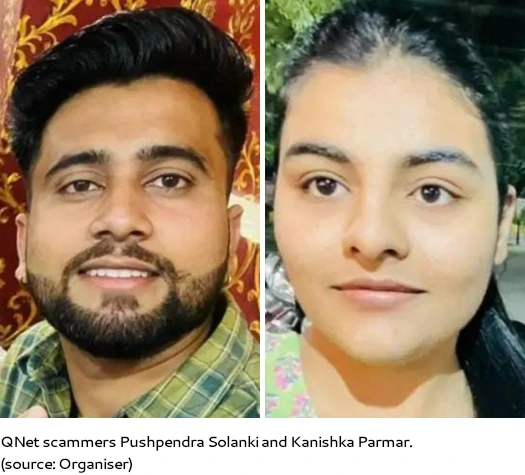QNet criminal case opened in Indore, India
![]() A QNet victim has filed a complaint in Indore, India.
A QNet victim has filed a complaint in Indore, India.
Kanishka Parmar, a local QNet promoter, recruited Kusum into QNet on the promise of a Rs. 10 million ROI over five years (~$119,000 USD).
Kusum signed up for around Rs. 100,000 (~$1190 USD), only to then realize she’d been duped.

As reported by the Organiser on September 2nd;
Kusum trusted the accused as Kanishka Parmar had been her long-time roommate, and Pushpendra Solanki, Kanishka’s alleged boyfriend, also persuaded her to invest in the business, promising that they would eventually drive flashy cars like Mercedes, BMW, and Audi.
 QNet is a pyramid scheme run by Vijay Eswaran (right) out of Malaysia. The only way to earn money in the scam is to recruit new victims.
QNet is a pyramid scheme run by Vijay Eswaran (right) out of Malaysia. The only way to earn money in the scam is to recruit new victims.
In recruiting Kusum, Solanki and Parmar denied QNet was “direct selling, network marketing, nor MLM”.
Kusum deposited Rs 1 lakh into their account via NEFT on September 13, 2022. However, after receiving the money, the accused couple made her attend seminars and training for 2-3 months.
When Kusum inquired about how to make money, they revealed that she would need to recruit people to earn money.
She was told that she would have to wear revealing clothes, meet people in high-end restaurants and hotels, and convince them to invest in the scheme, with amounts ranging from Rs 1 lakh to Rs 10 lakh each.
It was only at this point that Kanishka and Pushpendra disclosed the company’s name as QNET.
Apparently by this stage QNet’s refund period had expired.
As the investigation unfolds, the police are making concerted efforts to locate and apprehend the accused individuals.
The case has been registered under sections 420 (cheating), 406 (breach of trust), and 34 (acts done by several persons in furtherance of common intention) of the Indian Penal Code (IPC).
These charges reflect the seriousness of the crime and the potential consequences for the accused if found guilty.
Solanki has been arrested and charged. Parmar has gone into hiding.
While QNet has been officially banned in India since 2019, victims continue to be recruited through various shell companies.
The scope of fraud has gotten so bad a QNet victim association has been created to assist those defrauded. Some QNet victims in India have taken their lives.
Although criminal complaints continue to be filed and arrests made, India remains a top source of QNet recruitment.
As of July 2024, SimilarWeb tracked top sources of QNet website traffic as India (17%), Russia (16%), Turkey (10%), the UAE (6%) and the US (6%).
Russian authorities issued a QNet pyramid fraud warning in October 2022.

